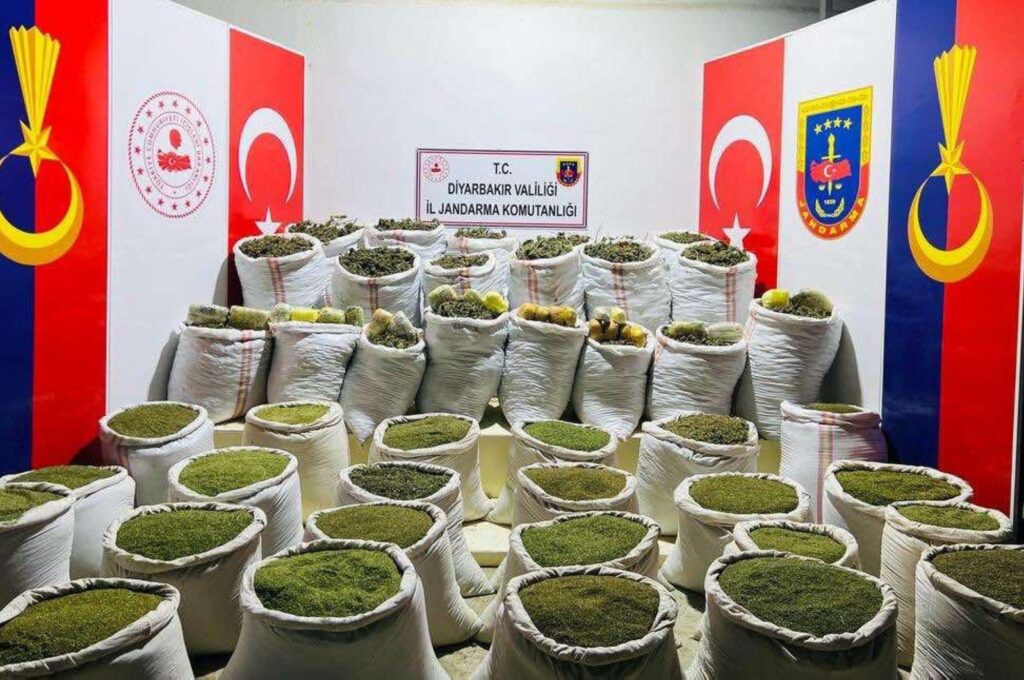The terrorist group PKK, which claimed thousands of lives in Türkiye over the past four decades, is known to reap the benefits of drug smuggling to finance its activities. Its far-reaching smuggling network stretches from Türkiye’s east, where security forces are cracking down on the drug trade fueled by the terrorist group, to Europe, including the United Kingdom.
Using gangs in its profitable drug trade across the U.K., the PKK is especially active in the capital London, according to a former member of north London’s notorious Tottenham Boys group.
The gang of around 400 men has the monopoly on distributing Class A and B drugs in north London, the former member, who would like to remain anonymous due to security reasons, told Anadolu Agency (AA). The man, who will be called Ali in this article, said the Tottenham Boys “is one of the biggest of the gangs” in London.
“The other big ones are the Bombers (Hackney Bombers) and the gang of Hayri Göztaş, also known as Adanalı Hayri.” “The Tottenham Boys, Bombers and Hayri Göztaş’ gangs control most of the British capital’s drugs trade alongside with some smaller Albanian, Jamaican and Irish groups,” Ali said.
An intelligence report by the U.K. Metropolitan Police highlighted how the Tottenham Boys, a Kurdish gang based in London, targeted local Kurdish businesses, used extreme violence, and was involved in racketeering to raise money for the terrorist group. “They are all connected to the organization, which runs its operations from Haringey, from the Kurdish Community Centre,” Ali added. He said: “And they all give money to the PKK on an ideological basis and because they feel obliged to do so.” “They all pay the (PKK) organization. They have to. Otherwise, they’ll be on the wrong side. It’s a kind of license to operate in London and the fee is payable to the organization.” “The organization’s center in London is in Haringey. The Kurdish Community Centre. You wouldn’t find any drugs there but the leaders there know all the gang ringleaders,” he said, adding that sometimes, gang members would ask community center leaders to resolve disputes among them.
Highlighting that the gangs were in a never-ending feud with one another, Ali said “they all have members killed by the rival gangs.” “They wouldn’t show mercy to anyone in their way,” he added. Further, the recent murder of DJ Koray, who owned a London-based Turkish radio station, might be linked to the gang, “according to what I’ve heard on the street,” Ali said. He was referring to the murder of Koray Alpergin who was found dead in Loughton, Essex, after allegedly being kidnapped in Enfield with his girlfriend. The investigation into the murder of the 43-year-old continues, according to the Metropolitan Police.
Another source who was once close to the gang run by Hayri Göztaş told AA that despite a lengthy prison sentence and avoiding deportation to Türkiye, Göztaş was also back on London’s streets. “Hayri resorts to threats and violence to force people in ways that would be profitable for his gang,” he said. Göztaş was convicted in October 2004 for exporting heroin into the U.K. He was sentenced to 16 years in prison, to be followed by deportation to Türkiye immediately upon his release but has remained in the country as he reportedly gave dozens of names he worked with at the time. “He is back in Haringey and Dalston. His organization is strong and they are still in the drug business,” the source who would not be named due to security reasons said, adding that the gang threatened some business owners to take over in Dalston.
The terrorist group reaps over $1.5 billion annually from its control over some 80% of the European illicit drug market, according to figures provided by Turkish Interior Minister Süleyman Soylu earlier this month. It uses these funds to wage its more than 40-year terror campaign against Türkiye, causing over 40,000 deaths, including innocent women, children and infants. According to Europol’s EU Terrorism Situation and Trend 2022 report, PKK activities in European countries include money laundering, extortion and drug trafficking, and they are coordinated by the so-called European Democratic Kurdish Society Congress (KCDK-E) located in Belgium. Further out from the continent, threats, beatings and brutal murders have been common practice for the PKK in Britain, which lists it as a terrorist group as does the United States, EU and Türkiye.
The PKK-affiliated gangs are known to also be trafficking large amounts of cocaine, along with heroin, to the U.K. and distributing the drugs across the country. “Like the cannabis trade, the PKK has large criminal interests in heroin with extensive ties in trafficking from Afghanistan to the U.K. at nearly every stage,” according to a 2012 report by the European Parliament. The PKK and its affiliates have “strong links to Germany and the U.K.,” the same report said. PKK-related organized crime retains “tight control over the estimated 30 tons (of heroin) a year that feed into the U.K.,” it said.


